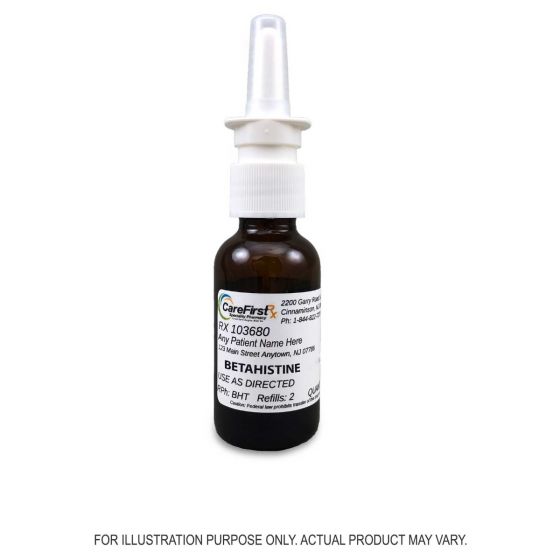Betahistine Nasal Spray Compounded
Betahistine dihydrochloride is used as a treatment for Ménière’s syndrome.
This product requires refrigeration (ice packs) and will incur an extra charge of $19.95 per order.
This medication requires a prescription.
To process your order we will require a prescription from you or your Prescriber. We will only compound and dispense upon receipt of a valid patient specific prescription. Please note that our compounds are exclusively provided for individual patient and are not for office use.
- Your prescriber can mail or fax in the prescription
- You can mail in the original prescription
- We can contact your prescriber for you
- You can transfer your prescription from another pharmacy
Are you a licensed Prescriber?
- We have convenient ways to get your prescription to us:
- Fax to (800) 786-1405 or (844) 922-7379
- Send electronically (e-prescribe) by:
- Searching for CareFirst Specialty Pharmacy in Mount Laurel, NJ 08054
- Using our NCPDP# 3151266
- Phone into (844) 822-7379
- For more information about our products and services:
- Please complete the prescriber form online
- Email us at [email protected]
Looking for a Different Strength?
Contact us for a Quote.
We are a nationally accredited PCAB compounding pharmacy and a .Pharmacy verified website. A verified .Pharmacy website designation ensures our patients and prescribing partners that our website is verified and safe.
Appearance may vary from image.
Related Names: Betahistine dihydrochloride, SERC, Betaserc, Vertimed, Polvertic
Indications: Vertigo in Ménière’s disease
Common Dose:24-48 milligrams daily
Use in pregnancy: Potential risk unknown
Pronunciation: (bay ta HISS teen)
What is this drug used for? It is used to treat dizziness having to do with Meniere's disease.
What do I need to tell my doctor BEFORE I take this drug?
For all patients taking this drug:
- If you have an allergy to betahistine or any other part of this drug.
- If you are allergic to any drugs like this one, any other drugs, foods, or other substances. Tell your doctor about the allergy and what signs you had, like rash; hives; itching; shortness of breath; wheezing; cough; swelling of face, lips, tongue, or throat; or any other signs.
- If you have an adrenal gland tumor called pheochromocytoma.
- If you have ever had stomach or bowel ulcers.
What are some things I need to know or do while I take this drug?
- Tell all of your health care providers that you take this drug. This includes your doctors, nurses, pharmacists, and dentists.
- Avoid driving and doing other tasks or actions that call for you to be alert until you see how this drug affects you.
- If you are 65 or older, use this drug with care. You could have more side effects.
- Tell your doctor if you are pregnant or plan on getting pregnant. You will need to talk about the benefits and risks of using this drug while you are pregnant.
- Tell your doctor if you are breast-feeding. You will need to talk about any risks to your baby.
- Tell your doctor and pharmacist about all of your drugs (prescription or OTC, natural products,vitamins) and health problems. You must check to make sure that it is safe for you to take this drug with all of your drugs and health problems. Do not start, stop, or change the dose of any drug without checking with your doctor.
What are some side effects that I need to call my doctor about right away?
WARNING/CAUTION: Even though it may be rare, some people may have very bad and sometimes deadly side effects when taking a drug. Tell your doctor or get medical help right away if you have any of the following signs or symptoms that may be related to a very bad side effect:
- Signs of an allergic reaction, like rash; hives; itching; red, swollen, blistered, or peeling skin with or without fever; wheezing; tightness in the chest or throat; trouble breathing, swallowing, or talking; unusual hoarseness; or swelling of the mouth, face, lips, tongue, or throat.
- Feeling sleepy.
- A heartbeat that does not feel normal.
- Dizziness or passing out.
What are some other side effects of this drug?
All drugs may cause side effects. However, many people have no side effects or only have minor side effects. Call your doctor or get medical help if any of these side effects or any other side effects bother you or do not go away:
- Headache.
- Upset stomach or throwing up.
- Belly pain or heartburn.
- Bloating.
These are not all of the side effects that may occur. If you have questions about side effects, call your doctor. Call your doctor for medical advice about side effects.
You may report side effects to your national health agency.
How is this drug best taken?
- Use this drug as ordered by your doctor. Read all information given to you. Follow all instructions closely.
- Take with or without food. Take with food if it causes an upset stomach.
- Take this drug at the same time of day.
What do I do if I miss a dose?
- Skip the missed dose and go back to your normal time.
- Do not take 2 doses at the same time or extra doses.
How do I store and/or throw out this drug?
- Store at room temperature.
- Keep lid tightly closed.
- Store in a dry place. Do not store in a bathroom.
- Keep all drugs in a safe place. Keep all drugs out of the reach of children and pets.
- Throw away unused or expired drugs. Do not flush down a toilet or pour down a drain unless you are told to do so. Check with your pharmacist if you have questions about the best way to throw out drugs. There may be drug take-back programs in your area.
General drug facts
- If your symptoms or health problems do not get better or if they become worse, call your doctor.
- Do not share your drugs with others and do not take anyone else's drugs.
- Keep a list of all your drugs (prescription, natural products, vitamins, OTC) with you. Give this list to your doctor.
- Talk with the doctor before starting any new drug, including prescription or OTC, natural products, or vitamins.
- Some drugs may have another patient information leaflet. If you have any questions about this drug, please talk with your doctor, nurse, pharmacist, or other health care provider.
- If you think there has been an overdose, call your poison control center or get medical care right away. Be ready to tell or show what was taken, how much, and when it happened.
References:
Lacour M, van de Heyning PH, Novotny M, Tighilet B. Betahistine in the treatment of Ménière’s disease. Neuropsychiatric Disease and Treatment. 2007;3(4):429-440.
SERC [product monograph]. 85 Advance Road, Etobicoke Ontario, M8Z 2S6, Canada. 2014.
Betahistine. Lexi-Drugs. Lexicomp. Wolters Kluwer Health, Inc. Riverwoods, IL. Available at: http://online.lexi.com. Accessed July 23, 2018.
Consumer Information Use and Disclaimer: This information should not be used to decide whether or not to take this medicine or any other medicine. Only the healthcare provider has the knowledge and training to decide which medicines are right for a specific patient. This information does not endorse any medicine as safe, effective, or approved for treating any patient or health condition. This is only a brief summary of general information about this medicine. It does NOT include all information about the possible uses, directions, warnings, precautions, interactions, adverse effects, or risks that may apply to this medicine. This information is not specific medical advice and does not replace information you receive from the healthcare provider. You must talk with the healthcare provider for complete information about the risks and benefits of using this medicine.
Betahistine dihydrochloride
Consult your prescriber
This is a compounded medication specifically made for you based on a prescription from your licensed physician.
Troches and suppositories require refrigeration (ice packs) and will incur an extra charge of $19.95 per order.


